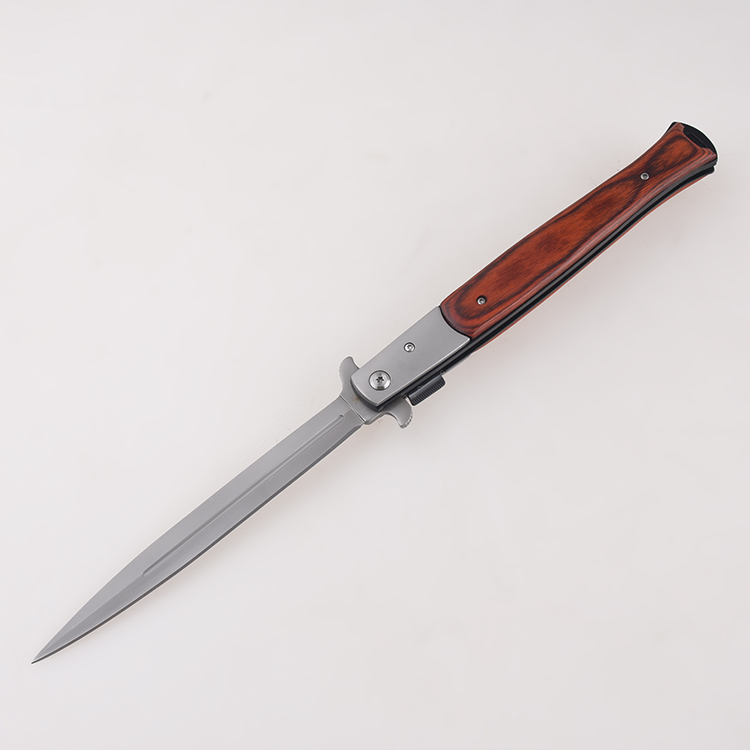
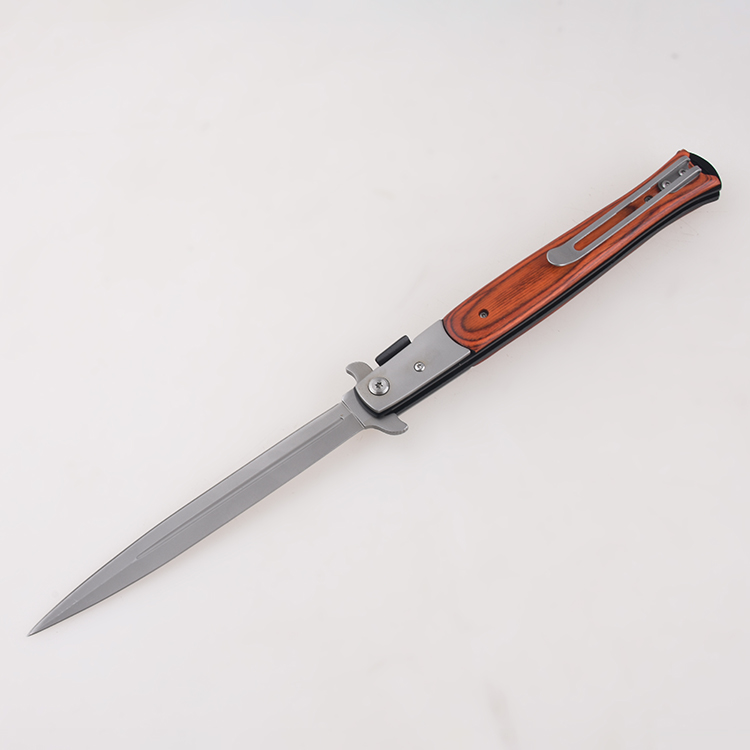
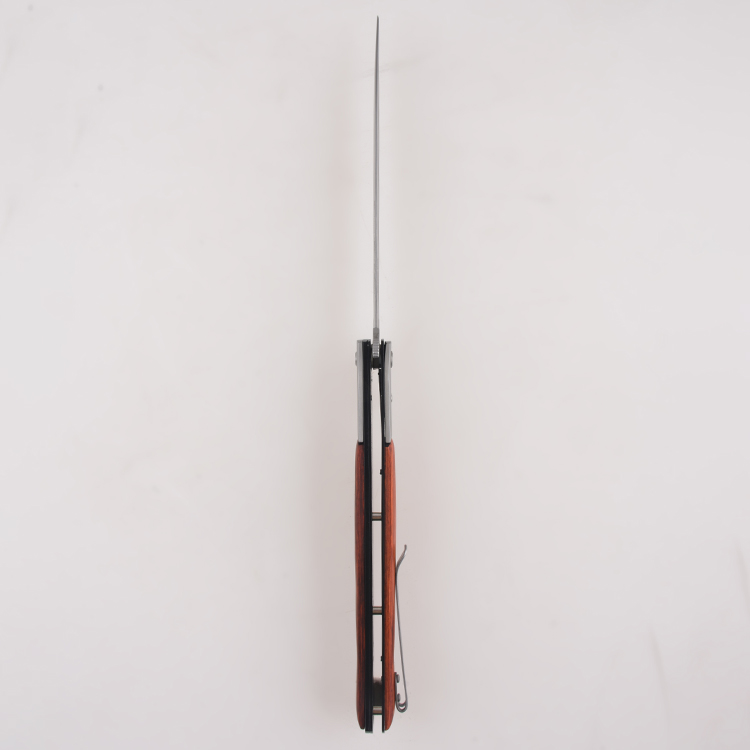
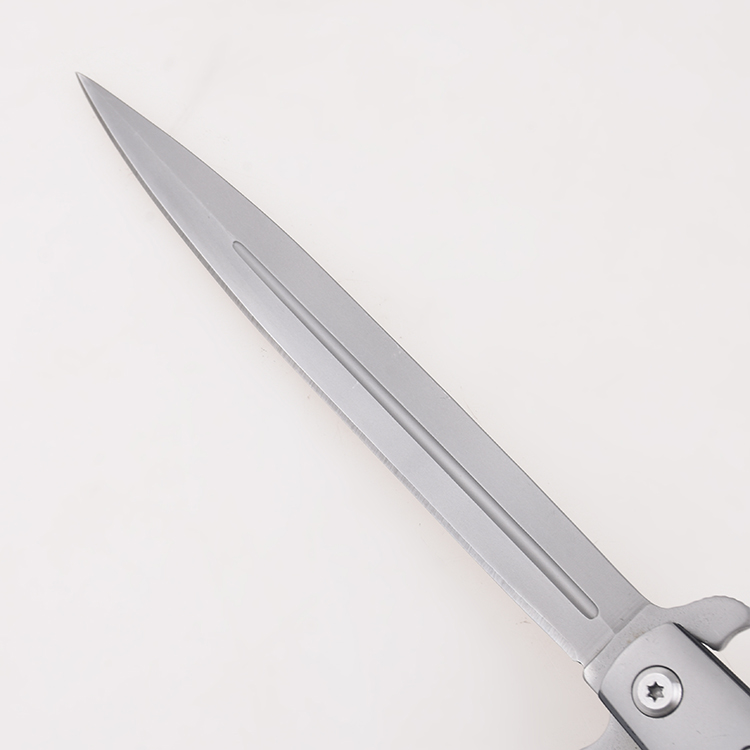
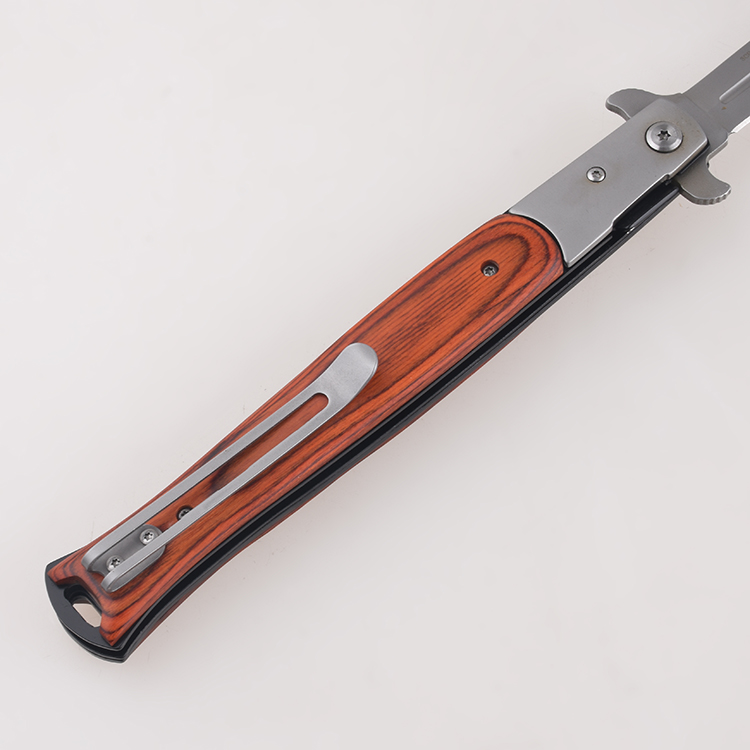
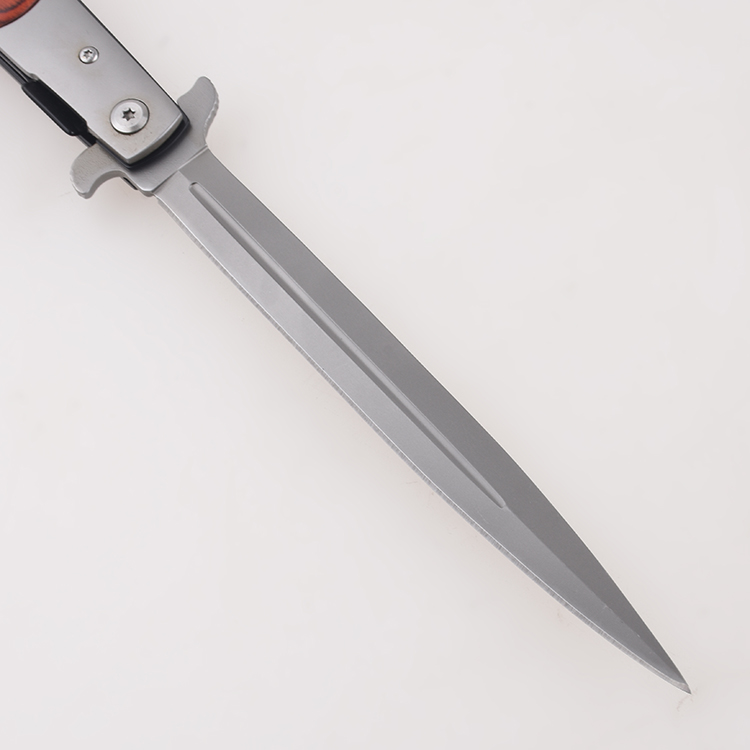

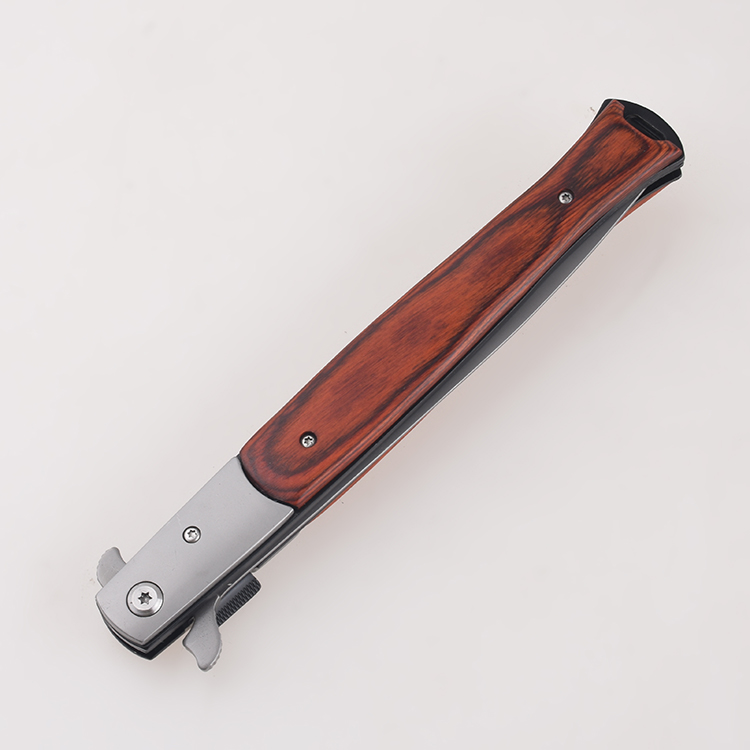
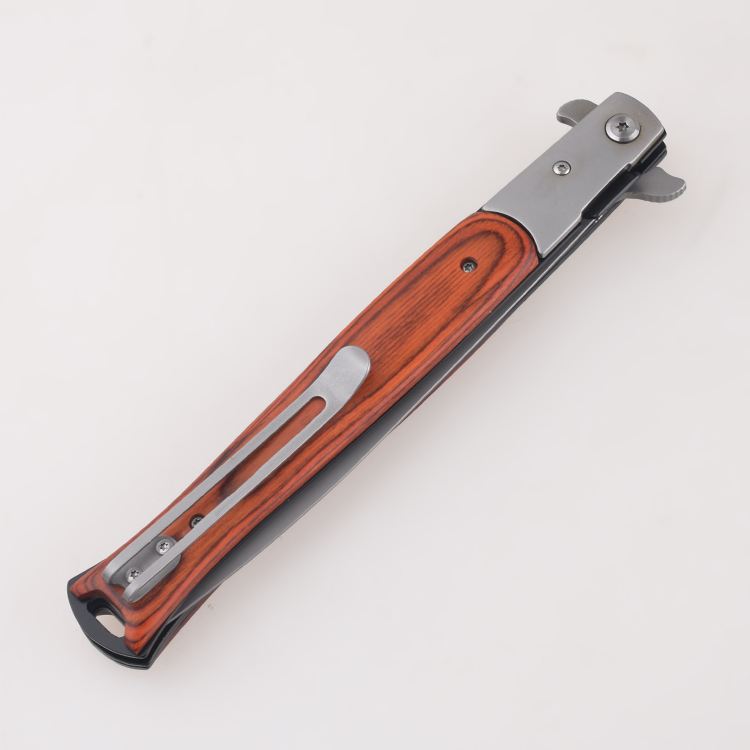
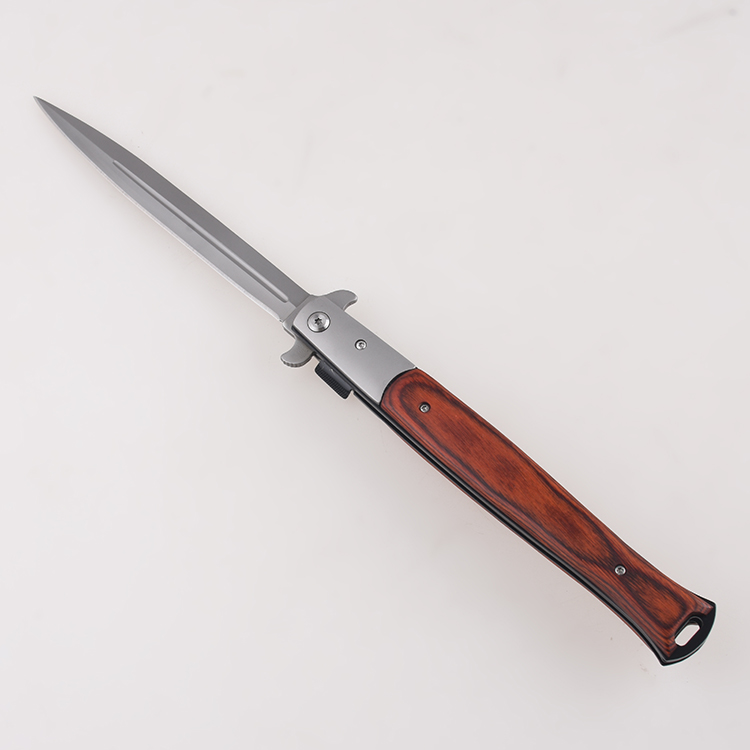
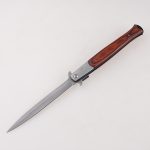
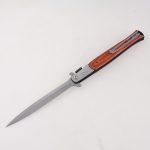
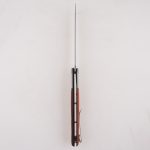
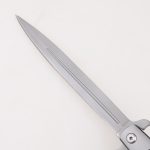
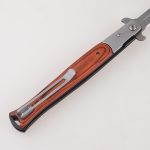
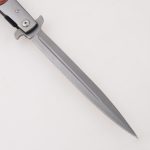
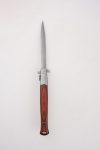
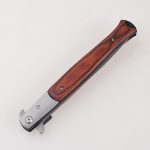
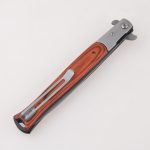
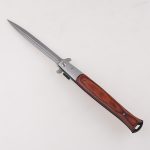
Item NO.: FR-0510
Item segment: Folding knife
Blade material: 3Cr13
Handle material: 2Cr13 + color wood
Blade HRC: 50-52
Blade thickness: 0.091” / 2.3mm
Blade length: 5.98” / 152mm
Handle thickness: 0.72” / 18.3mm
Total length: 13.03” / 331mm
Weight: 7.32 oz / 207.5g
Blade style: Spear point
Handle color: Wooden
Pocket clip: Tip-up
Lock mechanism: Liner lock
Open way: Flipper
Blade finish: Bead blasted
Blade grind: Spike grind
ODM Regular MOQ: 1200
Remark: Can make a slip-joint in the pivot
In the realm of cutting-edge innovation and timeless design, Shieldon Manufacturing & Trading Combo presents the FR-0510 Folding Knife – a synthesis of robust functionality and classic aesthetic appeal. For the discerning collector or the practical outdoorsman, the OEM long wood handle stiletto bayonet with a blood groove blade encapsulates the essence of a premium folding knife. This purchasing description delves into the craftsmanship behind the FR-0510, showcasing why it stands as a paragon amidst Shieldon’s esteemed collection.
Detailed Product Specifications:
Advantages and Features:
The Shieldon FR-0510 is an intricately designed folding knife that speaks volumes of its quality through every component. The spear point bayonet blade features a prominent blood groove, not only enhancing the knife’s visual appeal but also reducing weight and potentially increasing cutting efficiency.
Each FR-0510 benefits from Shieldon’s commitment to precision engineering and quality control. With the option to add an assist-spring in the pivot, users can customize their experience for even quicker blade deployment.
Strategic Sourcing with Shieldon:
Shieldon’s ODM Regular MOQ stands at 1200 units for the FR-0510, a testament to the company’s commitment to providing tailored solutions for businesses of all sizes. This approach to Minimum Order Quantity ensures that even smaller businesses can access high-quality products without excessive inventory risk.
Tailored for Your Market:
Understanding that each market has its unique demands, Shieldon’s engineers are prepared to work closely with clients to customize the FR-0510 to meet specific requirements. Whether adjusting materials, mechanism, or design details, Shieldon’s flexible manufacturing process allows for a personalized product that aligns with your strategic business goals.
Conclusion:
The Shieldon FR-0510 folding knife is more than a tool; it is a statement of sophistication and practicality combined. For those looking to source a premium outdoor knife that marries the reliability of modern engineering with the finesse of timeless design, the FR-0510 stands as an ideal choice.
With Shieldon’s expertise in Manufacturing & Trading, clients can rest assured that they are not only getting a product of exceptional quality but also a strategic sourcing experience that is as seamless as it is satisfactory. Whether for retail, wholesale, or private label, the FR-0510 is a cut above the rest, ready to carve a niche in markets worldwide.
The folding knife, a compact tool of versatility, has etched its place in pockets and pouches of enthusiasts worldwide. Its functionality extends beyond mere cutting; it’s a survival implement, an everyday carry essential, and for some, a collectible artifact. Understanding the basic structure of a folding knife is fundamental for users, collectors, and curious minds alike. Here we dissect the anatomy of this ingenious device, laying bare the components that compose its form and enhance its function.
The Blade: The Cutting Edge
At the heart of any folding knife is the blade, the purposeful piece of hardened metal ready to tackle cutting tasks. Folding knife blades come in various shapes, including drop point, clip point, and tanto, each tailored to specific uses. The blade’s steel composition can range from stainless to high carbon varieties, affecting characteristics such as edge retention, corrosion resistance, and overall toughness.
The Handle: Grip and Ergonomics
Encasing the blade is the handle, designed to provide a secure and comfortable grip. Handles integrate materials like wood, metal, synthetic composites, or even advanced G-10 laminate, offering durability and aesthetic appeal. The handle’s contours, jimping (notched sections), and texturing are all critical for control and comfort during use.
The Pivot: The Folding Mechanism
Joining the blade to the handle is the pivot, a pivotal point (pun intended) that allows the blade to swing open and close. The pivot mechanism must balance ease of movement with the blade’s secure positioning when deployed. High-quality knives often feature ball bearings or washers at the pivot for smooth operation and reduced wear over time.
The Lock: Ensuring Safety
A crucial safety feature of a folding knife is the lock mechanism. It prevents the blade from closing inadvertently during use. Common locking systems include liner locks, frame locks, and lockbacks. Each has its method of engaging and releasing, but all serve to keep the user safe from unintended blade closure.
The Opening Mechanism: Quick Access
In a moment’s notice, the need for a knife can arise. The opening mechanism dictates how swiftly and efficiently one can deploy the blade. Traditional folding knives may use a nail nick, while modern iterations often feature thumb studs, thumb holes, or flippers for one-handed opening.
The Pocket Clip: Carry Convenience
For ease of carry, many folding knives include a pocket clip. This feature allows the knife to be securely fastened to the edge of a pocket or belt, ensuring the knife is accessible and upright for quick deployment.
The Spacer, Screws, and Lanyard Hole: The Final Touches
The structural integrity of a folding knife is bolstered by spacers, which maintain the handle’s shape and provide internal support. Screws facilitate the assembly and maintenance of the knife, allowing for adjustment or disassembly when necessary. A lanyard hole at the end of the handle offers an additional carrying option, permitting the attachment of paracord or a keyring for accessibility and loss prevention.
Maintenance and Care
Understanding the structure of a folding knife also brings the responsibility of maintenance. Regular cleaning of the blade, pivot, and locking mechanism ensures longevity and reliability. Lubrication of the pivot keeps the action smooth, while periodic sharpening maintains the blade’s cutting efficiency.
In summary, the folding knife is a marvel of design that combines utility and artistry. Its structure is a coherent system where each component plays a role in delivering performance and user satisfaction. The blade is the workhorse, the handle provides control, the pivot brings fluid motion, the lock ensures safety, the opening mechanism facilitates readiness, and the pocket clip, screws, and lanyard hole add to its practicality.
Whether a novice or a seasoned user, knowing the anatomy of a folding knife empowers you to choose, use, and care for it wisely. The folding knife is not just a tool but a companion for the everyday adventurer, the pragmatist, and the artisan. With this knowledge, you’re better equipped to select and maintain a folding knife that serves your needs, reflects your style, and stands the test of time.
We are ready to help at any stage of your OEM knife project. Send us your enquiry and your budget and we will get back to you within 24 hours.